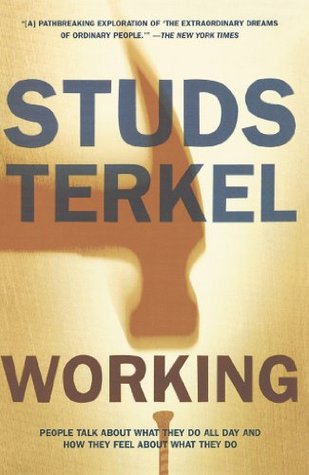More on this book
Community
Kindle Notes & Highlights
by
Studs Terkel
Read between
November 13 - November 23, 2021
This book, being about work, is, by its very nature, about violence—to the spirit as well as to the body. It is about ulcers as well as accidents, about shouting matches as well as fistfights, about nervous breakdowns as well as kicking the dog around. It is, above all (or beneath all), about daily humiliations. To survive the day is triumph enough for the walking wounded among the great many of us.
It is about a search, too, for daily meaning as well as daily bread, for recognition as well as cash, for astonishment rather than torpor; in short, for a sort of life rather than a Monday through Friday sort of dying. Perhaps immortality, too, is part of the quest. To be remembered was the wish, spoken and unspoken, of the heroes and heroines of this book.
Nora Watson may have said it most succinctly. “I think most of us are looking for a calling, not a job. Most of us, like the assembly line worker, have jobs that are too small for our spirit. Jobs are not big enough for people.”
As a bright, assertive woman, I had no power. As a cold, manipulative hustler, I had a lot. I knew I was playing a role. Most women are taught to become what they act. All I did was act out the reality of American womanhood.
The job makes those who aren’t really bad bigots worse after a while. You could take a tender white boy, give him a badge and a gun, and man! he becomes George Wallace over night. You have to change the rationale by which they work. We must have a system where they get points for helping people rather than hurting them.
Old men can’t do the work I do. They had one about a year ago, and he had three heart attacks. And they finally gave him a broom. He was about forty. Yeah, forty, that’s an old man around here.
Once I get into industrial relations—I got corporate law planned—then it won’t be a job any more ’cause I will enjoy what I’m doing. It’s the difference between a job and a career. This is not a career.
It’s a strange thing about truckers, they’re very conservative. They come from a rural background or they think of themselves as businessmen. But underneath the veneer they’re really very democratic and softhearted and liberal. But they don’t realize it. You tell ’em they’re liberal and you’re liable to get your head knocked off. But when you start talking about things, the war, kids, when you really get down to it, they’re for everything that’s liberal. But they want a conservative label on it. It’s a strange paradox.
When it gets quiet here, your mind strays and you start thinking of many things. I find myself talking about the future but I’m always thinking about the past.
Is my job important? It’s a question I ask myself. It’s important to people who use financial statements, who buy stocks. It’s important to banks. (Pause.) I’m not out combatting pollution or anything like that. Whether it’s important to society . . . (A long pause.) No, not too important. It’s necessary in this economy, based on big business. I don’t think most of the others at the firm share my views. (Laughs.)
After a certain point, how much more money can you make? In my climb, I’ll be honest, money was secondary. Unless you have tremendous demands, yachts, private airplanes—you get to a certain point, money isn’t that important. It’s the power, the status, the prestige. Frankly, it’s delightful to be on top and have everybody calling you Mr. Ross and have a plane at your disposal and a car and a driver at your disposal. When you come to town, there’s people to take care of you.


